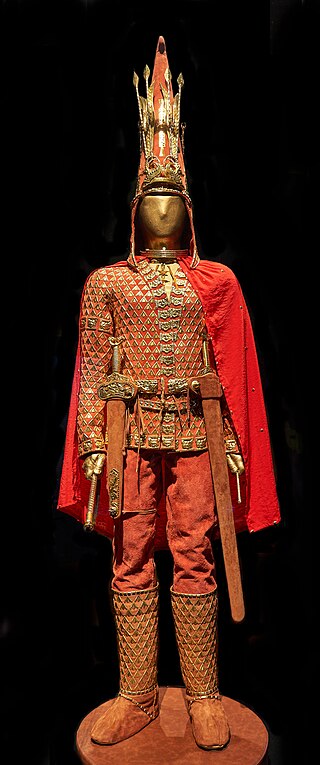Saka were the Achaemenid "Scythian" satrapy.
Contents
Saka may also refer to:
Saka were the Achaemenid "Scythian" satrapy.
Saka may also refer to:
Kuru may refer to:
Nara or Na-ra may refer to:
Veli is a male Finnish and Estonian given name, meaning brother. It is also an Ottoman Turkish name, mainly used by Ottoman affiliated populations as a male given name, meaning guardian. Its original etymology in Arabic meaning a "friend of God" when used in a religious-mystical context, and is the singular form of Evliya.

The Saka, Shaka, or Sacae were a group of nomadic Eastern Iranian peoples who historically inhabited the northern and eastern Eurasian Steppe and the Tarim Basin.
Sala or SALA may refer to:
Aru or ARU may refer to:

Saka is a town located in Aki District, Hiroshima Prefecture, Japan. As of 31 May 2023, the town had an estimated population of 12,853 in 5879 households and a population density of 820 inhabitants per square kilometre (2,100/sq mi). The total area of the town is 15.69 square kilometres (6.06 sq mi).

Indo-Scythians were a group of nomadic Iranian peoples of Scythian origin who migrated from Central Asia southward into the northwestern Indian subcontinent, precisely into the modern-day South Asian regions of Afghanistan, Pakistan and northern India. The migrations persisted from the middle of the 2nd century BCE to the 4th century CE.
Vikram Samvat, also known as the Vikrami calendar or, in Nepal, Nepal Sambat, is a Hindu calendar historically used in the Indian subcontinent and still used in several states.. It is a lunisolar calendar, using twelve to thirteen lunar months each solar sidereal years. The year count of the Vikram Samvat calendar is usually 57 years ahead of the Gregorian calendar, except during January to April, when it is ahead by 56 years.
Raja is an Indian term for a monarch, or princely ruler.
Masi may refer to:

The Shaka era is a historical Hindu calendar era, the epoch of which corresponds to Julian year 78.
The Western Satraps, or Western Kshatrapas were Indo-Scythian (Saka) rulers of the western and central parts of India, between 35 and 415 CE. The Western Satraps were contemporaneous with the Kushans who ruled the northern part of the Indian subcontinent, and were possibly vassals of the Kushans. They were also contemporaneous with the Satavahana (Andhra) who ruled in Central India. They are called "Western Satraps" in modern historiography in order to differentiate them from the "Northern Satraps", who ruled in Punjab and Mathura until the 2nd century CE.
In Albanian and Turkish, Kadri is a masculine given name. In Estonian, Kadri is a feminine given name. The name entered Latvian as the variant of Kadri, Kadrija.
Barda or BARDA may refer to:
Kunda may refer to:
Koda or KODA may refer to:
Shaka was the leader of the Zulu Kingdom in the early 19th century.

The legacy of the Indo-Greeks starts with the formal end of the Indo-Greek Kingdom from the 1st century, as the Greek communities of central Asia and northwestern India lived under the control of the Kushan branch of the Yuezhi, Indo-Scythians and Indo-Parthian Kingdom. The Kushans founded the Kushan Empire, which was to prosper for several centuries. In the south, the Greeks were under the rule of the Scythian Western Kshatrapas.
Anna may refer to: